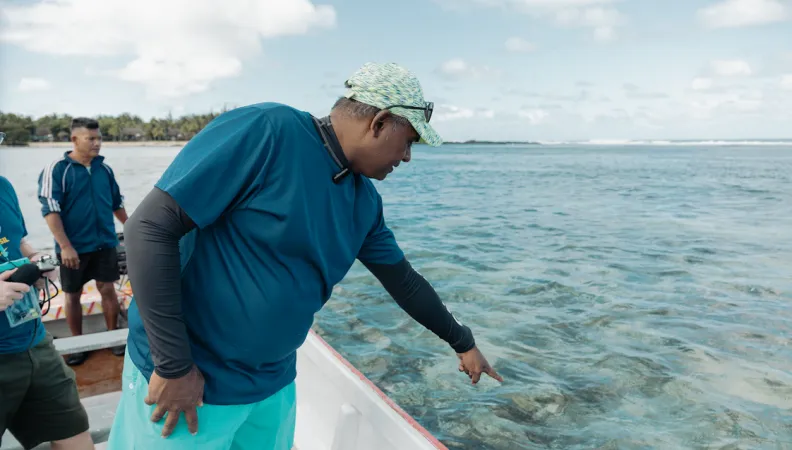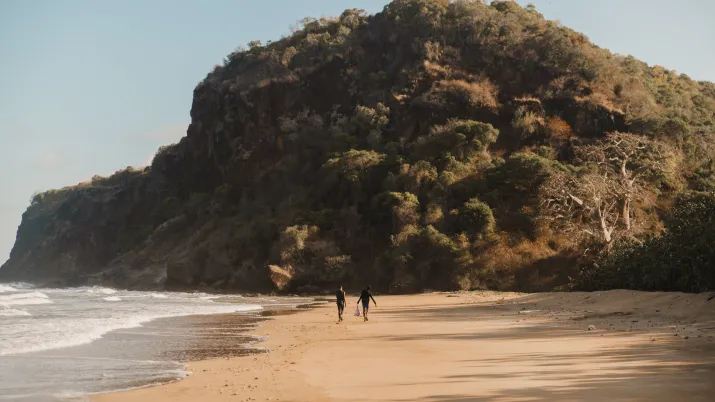Share the page
Marine areas of island territories, central to the challenges of preserving the oceans
Published on

At the United Nations Ocean Conference, to be held in Nice from 9 to 13 June 2025, governments, companies, NGOs and scientists will be gathering to discuss the damage caused to the world’s oceans, which are severely impacted by climate change and increased human activities, and the coalitions and action plans to address it. Expertise France, in keeping with France’s policy lines and the achievement of SDG 14, is committed to the protection of marine environments across all sectors, such as the blue economy.
In the Indian Ocean, an extensive regional programme to conserve island biodiversity
Structuring regional networks and a multi-stakeholder dialogue for biodiversity conservation
To address the urgent need to stem biodiversity loss in one of the world’s richest and most endangered hotspots, the Varuna programme, a €10 million regional initiative financed by Agence Française de Développement (AFD) and implemented by Expertise France since January 2022, aims to assist the South West Indian Ocean Islands – Union of the Comoros, Madagascar, Mauritius, Seychelles, Mayotte and Réunion (France) – with the preservation of their natural environments.
The programme’s overall objective is to structure networks of regional stakeholders. The aim is to encourage coordinated efforts and sustainable biodiversity management, and support the integration of ecological transition issues among economic operators, in particular through a public-private dialogue and business engagement. It also encourages the contribution of research to science-society dialogues, with the aim of disseminating knowledge and increasing ownership of the issues by citizens and decision-makers.
In 2025, 17 pilot projects are involving various stakeholders in the 6 territories in the region: NGOs, managers of protected areas, private companies, public institutions and research institutes. The programme is thereby building a network among more than 80 institutions (scientific, public, private, associations) through meetings, workshops and joint productions.
In this respect, Varuna is playing a unifying role, by building bridges between islands, institutions, knowledge and generations to make environmental cooperation a structural driver of sustainable regional development.
Strengthening local stakeholders for the protection and development of their maritime heritage
The regional networks of public, economic and scientific stakeholders in the Indian Ocean islands play a pivotal role in biodiversity awareness and conservation at local level. By helping to strengthen and coordinate these networks and the dialogue between the private, public and scientific sectors and civil society, the Varuna programme is supporting this process.
The programme has a clear objective: place biodiversity at the heart of regional decisions. This requires strengthening interconnections between territories, harnessing local knowledge, mobilising all sectors, including economic sectors, and enabling local communities to be actors in the ecological transition.
Varuna does not only finance projects: it is building collective dynamics and establishing the conditions for inclusive and sustainable multi-stakeholder environmental governance.
- For example, the “Network of Marine Protected Area Managers” (AMP) project, implemented by Réserves Naturelles de France under the Varuna programme, supports a regional network of more than 71 professionals in the field of nature (including wardens, conservationists and leaders) who work in nature reserves covering more than 100,000 km2 and lead a remarkable island community of practice. These synergies are thereby developed at a local level, for example, through training activities and mentoring, which ensure that there is a more permanent integration of good practices. These practices enable MPA managers to more effectively address the many threats faced by marine ecosystems, such as illegal fishing, land-based pollution and growing human pressures
- Varuna also helps ensure that biodiversity is taken into account by operators in the private sector and in the regional and local economic fabric. Through its Indian Ocean Business Biodiversity Fund (FBBOI), Varuna encourages and finances the creation of sustainable value chains, and promotes responsible economic activities, for example, in the sectors of ecotourism, fishing and biodiversity products. The objective of these projects is to stimulate a sustainable local economy, contribute to creating green jobs, and improve the resilience of territories to environmental challenges
By promoting integrated development, where culture, the economy and the environment are mutually enriching, Varuna is thereby helping to build a more sustainable and inclusive future for the entire South-West Indian Ocean region.
In the Overseas Countries and Territories (OCTs), reconciling the protection of the marine environment and human development
The OCTs in the Caribbean, Pacific and Southern and Antarctic Territories may have diverse ecosystems and economic models, yet they have a number of vulnerabilities and challenges in common in terms of development. To address them, these island countries and territories have taken various steps and established national and regional instruments to develop and diversify their economies, while increasing their resilience to climate change.
In the Caribbean, along with the OCTs in the region, the RESEMBID programme has prepared and implemented a portfolio of 17 marine biodiversity projects for a total of €8.5 million in 11 island territories.
In addition to action to protect and restore marine protected areas, coral reefs, mangroves and seagrass beds, the activities also focus on the management of sustainable fisheries through monitoring, assistance with replenishing fish stocks, and the monitoring of the sustainable trade of endemic species, as well as spatial mapping and integrated coastal zone management. They also include school programs on environmental education.
Since the launch of the programme in 2019, more than 15,000 local beneficiaries have received direct support through projects focused on marine biodiversity in Anguilla, Aruba, Bonaire, the British Virgin Islands, the Cayman Islands, Curaçao, Sint Maarten, Saint-Barthélémy and the Turks and Caicos Islands.
In Aruba, a documentary has been made about the Turning the Tide project. This project, implemented by Wageningen University & Research, Aruba Conservation Foundation, the University of Aruba and the ScubbleBubbles Foundation and financed by the RESEMBID programme, aims to restore healthy and resilient marine ecosystems. This 90-minute documentary, filmed in IMAX, aims to raise awareness among the international community of the importance of conserving the marine and coastal biosphere in the Caribbean.
The Green Overseas Programme covers 24 European and British Overseas Countries and Territories. It is taking action on the energy transition, resilience to climate change, and access to climate finance in the regions of the Atlantic, Indian, Pacific, Arctic and Southern oceans, as well as in the Caribbean Sea. This support includes developing more climate-resilient building codes, improving the energy performance of buildings, as well as the sustainable management of natural resources. The Green Overseas Programme is taking concrete action on issues such as the adaptation of infrastructure to extreme climate events (hurricanes, floods), the optimisation of energy consumption, and the resilience of food and water systems. Following the discussions at COP28, and in particular during the side event on the Multidimensional Vulnerability Index (MVI) as a tool for access to climate finance, in October 2024, the GOCFF (Green Overseas Climate Finance Forum) strengthened the dialogue with the OCTs. This has helped identify their specific needs and jointly develop technical and financial tools tailored to their circumstances. Indeed, the main challenge facing these territories is to make their voices heard on the international scene. This substantive work was put to use during the 2025 edition of the UN Ocean Conference.
On the same topic
Acting for the climate and the planet: the green and blue approaches
Expertise France works with its partners to mitigate the effects of climate change and protect biodiversity. It is helping to bring about a just energy transition in many countries, generating both en...
Published on October 31, 2024

